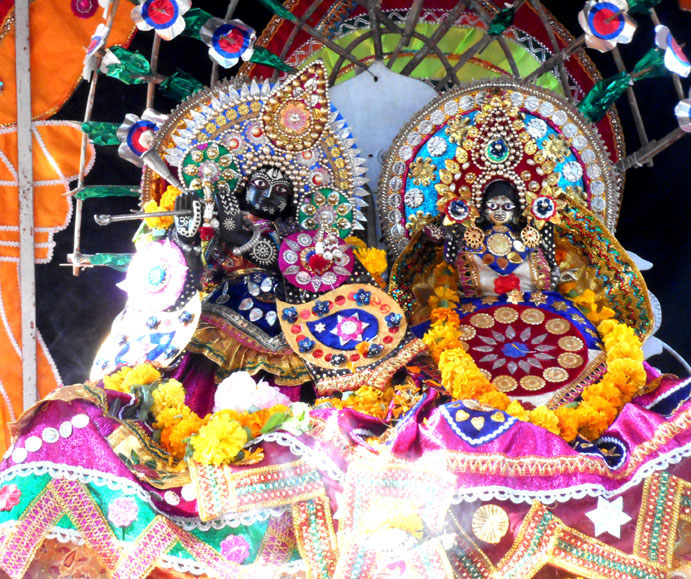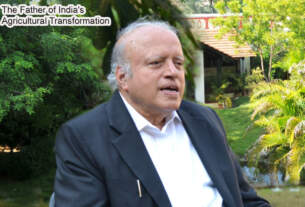In 3228 BCE, in the ancient city of Mathura, India, a child was born who would profoundly influence the spiritual and temporal destiny of mankind—Sri Krishna. Over his remarkable 125-year lifespan, Sri Krishna left an indelible mark on humanity’s collective consciousness, imparting lessons about devotion, dharma (righteousness), and the ultimate reality. He served as a model for people of his time, as well as for those in the modern world and generations to come. Even today, hundreds of millions of people pray to him, chant his names, meditate on his form, and strive to embody his teachings. His life has inspired a rich treasure trove of poetry, music, painting, sculpture, and various other forms of fine arts.
Sri Krishna played numerous roles throughout his life, including that of a child, a brother, a charioteer, a warrior, a disciple, a guru, a cowherd, a messenger, and the beloved of the gopis (milkmaids). Remarkably, he never lost sight of the fact that these were merely roles, and his true nature was that of eternal, ever-blissful consciousness. This detachment enabled him to perform flawlessly and maintain a perpetual smile on his face.
Very few individuals have the capacity to rejoice both in victory and defeat, and Sri Krishna was one of them. He celebrated both life and death, even smiling at the moment of his passing. His message to humanity was to infuse life with laughter and joy.
Krishna’s life, as narrated in various scriptures such as Srimad Bhagavatam, Garga Samhita, Visnu Purana, Brahmavaivarta Purana, Mahabharata, Harivamsa, and several other puranas, is filled with significant events and teachings. He was born in a prison cell, as a sage had prophesied that his egoistic uncle, King Kamsa, would be killed by Devaki’s child. To protect him, Krishna’s parents, Devaki and Vasudeva, secretly sent him to Vraja, where he was raised by a foster mother, Yasoda. In Vrindavan, a village within Vraja, Krishna captured the hearts of the gopis, the cowherds of the village, through his playful interactions, jokes, and the occasional theft of their butter and milk. What he truly stole, however, were their hearts.
Kamsa attempted to assassinate Krishna on numerous occasions, but none succeeded. Eventually, Krishna returned to Mathura and vanquished Kamsa, restoring dharma to the land.
Interestingly, Krishna never returned to Vrindavan after defeating Kamsa. The pain of separation was excruciating for the gopis, driving them to a state of profound devotion. Their relentless yearning for Krishna led to the purification of their minds, enabling them to perceive the divine presence in all aspects of creation.
One of the peak moments of devotion was the rasa-leela dance, where each gopi felt that Krishna was dancing with her alone. This transcendental experience elevated them to a state where they saw the divine in everything.
Among the gopis, Radha is celebrated as the most devoted. Their love symbolizes the highest form of devotion, inspiring humanity on the path to God.
Krishna’s next significant role was as a friend to the Pandavas, five virtuous and righteous brothers whose kingdom was usurped by their 100 half-brothers, the egoistic and unrighteous Kauravas. In the ensuing war, Krishna served as the charioteer of Arjuna, one of the Pandavas. It was during this time that Krishna delivered the Bhagavad-Gita, a 701-verse scripture that stands as his most significant gift to the world. Some believe that Krishna’s entire purpose for incarnating was to deliver this “Song of the Divine,” which contains profound wisdom and guidance for life.
Krishna’s teachings extended beyond the monastic path. He encouraged individuals to fulfill their worldly duties and responsibilities while remaining detached from the outcomes. His life exemplified how one could navigate worldly challenges while maintaining inner peace.
Krishna’s physical form departed at the age of 125 when he was accidentally shot by a hunter. Even in his final moments, he displayed boundless love, blessing the hunter. His life came full circle, as he was born and lived with a beatific smile—a testament to his enduring love and wisdom.





